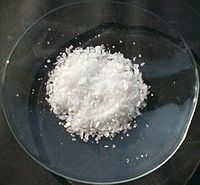
Photo from wikipedia
Crohn's disease (CD) and ulcerative colitis (UC) are two chronic relapsing inflammatory bowel diseases (IBD). Although there are several treatment options available to improve the symptoms of IBD patients, there… Click to show full abstract
Crohn's disease (CD) and ulcerative colitis (UC) are two chronic relapsing inflammatory bowel diseases (IBD). Although there are several treatment options available to improve the symptoms of IBD patients, there is no effective treatment that provides a definitive solution. In the present study, we aim to investigate the antioxidative/anti-inflammatory effects of oral administration of boric acid and Bacillus clausii in a rat trinitrobenzenesulfonic acid (TNBS)-induced colitis model. The effects of boric acid and B. clausii were examined in serum and colon tissues with the help of some biochemical and histological analyses. Elevated inflammation and oxidative damage were found in the blood and colon tissue samples in the TNBS-induced group according to the complete blood count (CBC), tumor necrosis factor (TNF) alpha, interleukin-35 (IL-35), malondialdehyde (MDA), glutathione peroxidase (GPx), myeloperoxidase (MPO), nitric oxide (NO), and histological findings. Particularly, the highest IL-35 level (70.09 ± 12.62 ng/mL) in the combined treatment group, highest catalase activity (5322 ± 668.1 U/mg protein) in the TNBS-induced group, and lower relative expression of inducible nitric oxide synthase in the TNBS-induced group than the control group were striking findings. According to our results, it can be concluded that boric acid showed more curative effects, even if B. clausii probiotics was partially ameliorative.
Journal Title: Biological trace element research
Year Published: 2022
Link to full text (if available)
Share on Social Media: Sign Up to like & get
recommendations!